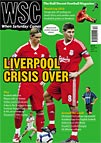 Some major European countries have received help in the 2010 play-offs. Jonathan O'Brien looks at a controversial draw
Some major European countries have received help in the 2010 play-offs. Jonathan O'Brien looks at a controversial draw
Would you bother watching a World Cup that didn’t have Cristiano Ronaldo prancing around in it? What about one that didn’t feature the silky skills of Andrei Arshavin? Or Franck Ribéry? Or even – gasp – Zlatan Ibrahimovic?
Chances are that you’d still rouse yourself to catch at least a fair number of the games; if you wouldn’t, then you probably weren’t that interested in the first place. FIFA, though, may not necessarily share other people’s faith that a World Cup deprived of a few big stars can still safely be viewed without any danger of nodding off. The recent declaration that the European play-off draw for 2010 would be seeded – meaning theoretically easier passages for France, Russia, Portugal and Greece – caught most observers off guard, and stirred up a far more vociferous reaction than probably had been anticipated.
In purely technical terms, FIFA did nothing underhand: at no stage of the qualification tournament had they announced that the play-offs would definitely be unseeded. Yet the suddenness and deeply odd timing of the announcement, at the end of September – right at the precise moment that the European groups were coming to the boil, with several of the continent’s heavy hitters in serious trouble – were always bound to raise questions. It’s hard to understand why the position couldn’t have been clarified a year ago when everything was starting off.
The most heated words came from the Ireland camp. Shay Given described FIFA’s actions as “disgusting” and “beyond belief”, going on to suggest that “people high up in [FIFA] delegations” came from countries who needed a “helping hand”. Giovanni Trapattoni warned that FIFA risked “the death of football” if they kept meddling with competition formats. FAI boss John Delaney, possibly unsurprisingly for a man who spends so much of his time in the company of other blazers, was more conciliatory: “We’d have been delighted to have got to the play-offs at the start of the group and we’ll take what we get.”
The official explanation was that the seedings were compiled in accordance with FIFA’s rankings – the same rankings that, year after year in the 1990s, placed Mexico and the Czech Republic in the top five (despite the latter’s failure to make either the 1998 or 2002 World Cups). The latest ones showed Croatia bizarrely rising by one place in the wake of their drubbing by England at Wembley.
The four seeds negotiated their qualifiers with varying degrees of clumsiness. Greece, still dining out on the ranking points from Euro 2004, lost home and away to an unexceptional Swiss side in probably the worst group of all. Russia couldn’t take any points off Germany, the only difficult opponent in their section. France, unbelievably still led by the increasingly wayward Raymond Domenech, stumbled embarrassingly in Vienna and twice couldn’t beat a rotten Romanian outfit. Portugal’s Carlos Queiroz almost outdid Domenech for ineptitude: a campaign speckled with 0-0 draws reached its grim nadir at home to ten-man Albania.
Three of the quartet (Russia being the exception) were top seeds in their groups anyway. Having failed to capitalise on that advantage, they’ve now been handed another one. Contrariwise, after facing the 2006 winners twice in their group, Ireland must now beat the 2006 runners-up merely to qualify. Slovenia, once again overachieving massively, will have to deal with Guus Hiddink. And Bosnia, originally fourth seeds in Group Five and possibly the world’s most improved team, face a Portugal side bristling with big reputations. (Exactly how justified those reputations are remains to be seen; Ronaldo was so dreadful in the group stage that he failed to score a single goal.)
FIFA have kept their hands clean in masterly style. Having earlier stayed silent and not offered any hostages to fortune, they can now claim with a straight face that this was how it was going to happen all along. But it’s naive to think that commercial considerations didn’t enter into their thoughts, or that their ultimate decision to spread their seed (as it were) wasn’t delayed as a result of those considerations. It’s also worth noting that USA 94, to take one example among many, didn’t seem to suffer too badly from the absence of Jean-Pierre Papin, Ryan Giggs, Jari Litmanen, George Weah, the Laudrup brothers and others.
Anybody with even a thumbnail knowledge of FIFA’s history won’t have been too astonished. This, after all, is the organisation which, at the draw for Spain 82, made England (absentees at the previous two World Cups) top seeds on the basis of them having won the trophy in 1966. Just as well Uruguay didn’t qualify that year.
From WSC 274 December 2009